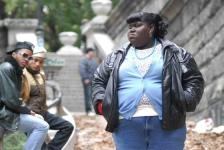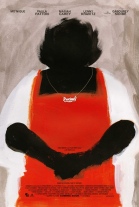Precious: Based on the Novel ‘Push’ by Sapphire
|  As a raw, provocative portrayal of the horrors of black poverty in America, Lee Daniels’ Precious: Based on the Novel ‘Push’ by Sapphire is drawing sharply mixed responses, with some praising what they see as its brutal honesty while others view it as backtracking cavalcade of racist stereotypes. In all fairness, the praise seems to be far outweighing the criticisms as the film arrives in theaters with two Sundance awards from last January, the official sanction of Oprah Winfrey and Tyler Perry (both of whom signed on as executive producers), dozens of laudatory reviews, and a wave of Oscar buzz; thus, its detractors (most notably The New York Press’ Armond White, who called it “a carnival of black degradation” and compared its portrayal of black American life to The Birth of a Nation) have little chance of making much of an impact on its reception. Yet, I think it’s important to listen to both sides, because as powerful and moving as Precious is, there are some problems with it that are difficult to ignore and, more importantly, offer compelling insight into the divided views of how race should be portrayed. As a raw, provocative portrayal of the horrors of black poverty in America, Lee Daniels’ Precious: Based on the Novel ‘Push’ by Sapphire is drawing sharply mixed responses, with some praising what they see as its brutal honesty while others view it as backtracking cavalcade of racist stereotypes. In all fairness, the praise seems to be far outweighing the criticisms as the film arrives in theaters with two Sundance awards from last January, the official sanction of Oprah Winfrey and Tyler Perry (both of whom signed on as executive producers), dozens of laudatory reviews, and a wave of Oscar buzz; thus, its detractors (most notably The New York Press’ Armond White, who called it “a carnival of black degradation” and compared its portrayal of black American life to The Birth of a Nation) have little chance of making much of an impact on its reception. Yet, I think it’s important to listen to both sides, because as powerful and moving as Precious is, there are some problems with it that are difficult to ignore and, more importantly, offer compelling insight into the divided views of how race should be portrayed.Precious takes place in Harlem in the late 1980s, a place where Reagan’s “Morning in America” never dawned. The heroine is 16-year-old Clareece “Precious” Jones (Gabourey Sidibe), whose challenges in life read like a laundry list of ghetto horrors: she is illiterate, morbidly obese, and has been repeatedly raped by her absentee father, delivering him one child with Down Syndrome at age 12 and is now pregnant by him again. She lives in a dingy tenement with her psychologically and physically abusive mother Mary (Mo’Nique), who resents her for taking “her man” and essentially treats her like an animal, but also needs her to keep the welfare checks coming. As a result of this lifetime of abuse and neglect, Precious has withdrawn deep inside herself, becoming a silent, sullen shell. The film thus confronts us with a hard question: In a world so twisted as hers, how does a girl like Precious find a way out? The answers turns out to be a special education program for at-risk girls to which Precious is drawn. Her teacher, Ms. Rain (Paula Patton), who is the kind, but demanding sort, forces Precious and her classmates to write every day, and in learning to write and therefore to express herself Precious finds both her voice and a potential path to salvation. The 1996 novel on which the film was based, which was penned by the poet and performance artist Sapphire, was written entirely from Precious’ perspective, taking the form of the journal entries she writes for Ms. Rain’s class. First-time screenwriter Geoffrey Fletcher takes a fairly conventional route in translating Precious’ interiority into cinematic terms by giving us frequent voice-over narration, much of which is drawn directly from the book, and also by inserting fantasy sequences in which Precious imagines herself liberated from her current life and playing the role of a beloved movie star. Director Lee Daniels composes these fantasies as slightly ramshackle variations of the television dreams Precious sees everyday, and we take away from them not so much the glamour of wealth and fame, but rather the sense of attention, the fantasy of being the center of the universe, which Precious is anything but. There is no doubt that Precious is a powerful and moving film; if it weren’t, its detractors wouldn’t be so vocal. The film immerses us in the grim shadows of Precious’ world and hammers at us with provocative visual associations (such as intercutting the slow motion images of Precious being raped by her father with pigs feet frying in the kitchen) and an almost unrelenting sense of dirt and darkness (even when sunlight streams into Precious’ apartment, it feels greasy and contaminating). The performances are all uniformly impressive, with newcomer Gabourey Sidibe giving Precious a multifaceted intensity that is just barely discernible beneath her clenched, sullen exterior. Mo’Nique successfully sheds all vestiges of her comic persona and disappears into the bitter, self-loathing (and ironically named) Mary, who at all times is most frightening as a projection of the self-pitying monster Precious might become if she doesn’t escape. Yet, at the same time, Mary is not a one-note villain; despite the extremity of violence she directs at Precious, she is allowed a sustained sequence near the end that helps explain, but never excuses, all that she has done. The split over Precious ultimately comes down to the intertwined issues of race and poverty and whether you view the film as a socially meaningful portrait meant to evoke how the system has failed the downtrodden or a hysterical, demonizing portrait of black America as poor, lazy, and sexually corrupt. The film’s detractors accuse it of being a freakshow that exists either to stroke the egos of concerned white liberals or simply to exploit its controversial subject matter. Lee Daniels has certainly courted this kind of criticism before; his only other directorial effort is 2005’s Shadowboxer, which features Helen Mirren and Cuba Gooding, Jr. as romantically involved mother and stepson assassins, although he is best known for producing 2001’s racially charged Monster’s Ball, for which Halle Berry won her Oscar, and 2004’s The Woodsman, which featured Kevin Bacon as a child molester just released from prison. The film makes no bones about its abject representation of the lowest rungs of inner-city poverty, which some critics have charged is its own fantasy, cobbled together out of white America’s worst fears about what black life is like. Because Precious endures so many hardships, there is a tendency to wonder if the film isn’t much more than an overly constructed and sadistic punishment machine (late in the film, when there is a final and particularly gut-punching revelation, it does start to feel like a stacked deck). However, as Sapphire made clear in interviews when the book was originally published, the film’s depictions are based on what she witnessed firsthand living in Harlem for much of the 1980s, and anyone who has worked with the poor and oppressed will immediately recognize the harsh realities of the situations the film portrays. The issue of race is prominently charged throughout the film, and some critics may be incensed by the fact that Precious has grown to resent her blackness as a signifier of her poverty and misery. At one point in the film, taken directly from the book, she describes herself as “ugly black grease to be wiped away,” and in the first interior monologue we hear from her, she describes how she wants a “light-skinned” boyfriend with “good hair.” The extent to which Precious hates her own blackness is powerfully portrayed in the sequence in which she sits in front of her bedroom mirror, and in the reflection we see what she thinks she wants to be: a white girl with long blonde hair. A provocative sequence, no doubt, and one that is understandable given that Precious’ knowledge of the world outside her neighborhood has been formed almost entirely by what she sees on the TV screen every night with her mother, and it doesn’t take a sociologist or media analyst to tell you that images of whiteness on television tend to predominate. However, as many critics have pointed out, the film seems to unconsciously emulate Precious’ misconception of the value of skin color by casting virtually every positive black character with a relatively light-skinned actor: Paula Patton as the inspiration teacher, Lenny Kravitz as an attentive nurse who makes Precious feel pretty and explains to her the benefits of a healthy diet, and Mariah Carey as a well-meaning and racially vague social worker. This may have simply been a coincidence, but it’s a hard one to ignore, even if it might not reach the levels of racism that some critics are charging. Nevertheless, it’s not enough to undermine the film’s socially charged convictions or otherwise dilute the power of its images and ideas. While it ultimately refuses any simplistic answers to the crushing problems it portrays, Precious does offer a glimpse of salvation, ending on a note suggesting that Precious--and, most importantly, every abused and neglected girl just like her--has a chance, even if the system itself may be irretrievably broken. Copyright ©2009 James Kendrick Thoughts? E-mail James Kendrick All images copyright © Lionsgate |
Overall Rating: 

 (3)
(3)


